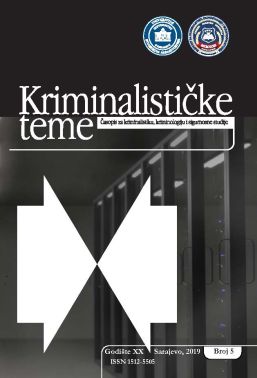VIKTIMIZACIJA STUDENATA U SAJBER PROSTORU: ISKUSTVA IZ SRBIJE
STUDENTS' EXPERIENCE IN CYBERSPACE: EXPERIENCES FROM SERBIA
Author(s): Ljiljana Stevković, Milica Popović, Milica KovačevićSubject(s): Security and defense, Higher Education , Behaviorism, Victimology, ICT Information and Communications Technologies
Published by: Fakultet za kriminalistiku, kriminologiju i sigurnosne studije Univerziteta u Sarajevu
Keywords: cyberspace; victimization; students; research; Serbia;
Summary/Abstract: The inspiration for the paper and the problem that the paper addresses: The life of a modern man is unthinkable without the use of modern technology. Additionally to the undeniable advantages of life in the digitalization era, cyberspace also represents a very risky domain of possible abuse, manipulation and various types of victimization. Young people, as the largest users of information technology assets, are at the highest risk of their misuse and victimization in cyberspace Aims of the paper (scientific and/or social): This paper aims at presenting a part of research findings which relate to the experiences of victimization of Belgrade University students in cyberspace. The results obtained can serve as a good basis for identifying characteristics of negative experiences of students in cyberspace, and planning preventive strategies aiming to eliminate students' cyber victimization. Methodology/Design: The research is exploratory in nature, implemented using a quantitative methodology, on a sample of 338 students of all levels of study at faculties from all scientific fields of the University of Belgrade. Research/paper limitations: The limitations of the research comes from the limitations of the techniques used for data collection. Although undoubtedly, useful for finding out the dark crime figures, victimization surveys and self-report surveys have their limitations, which are reflected in the unwillingness of the respondents to admit victimization and violent behaviour, as well as the subjectivity of the respondents (“mistakes” in memory, different perception of questions by different respondents etc.). Results/Findings: The results show that more than half of the respondents had the experience of victimization in cyberspace during the studies. Mostly, it was multiple victimization committed by unknown perpetrators. Additionally, respondents reported a cyber IPV victimization, mostly manifested in a form of different control tactics. Correlation between victimization in real life and cyberspace, with particular emphasis on the experience of violent victimization, was also found. General conclusion: It can be concluded that students are at high risk of different forms of cyber-victimization, with the most prevalent those forms than can be treated as serious crimes.
Journal: Kriminalističke teme – Časopis za kriminalistiku, kriminologiju i sigurnosne studije
- Issue Year: XIX/2019
- Issue No: 5
- Page Range: 247-270
- Page Count: 24
- Language: Bosnian, Croatian, Serbian

